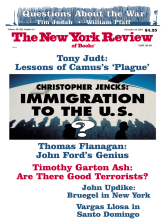To the Editors:
Ian Buruma’s survey of language death and the loss of linguistic diversity in the world [“The Road to Babel,” NYR, May 31] should stimulate thought on this important issue. Like almost all treatments of this topic, however, it conveys the real and tragic loss for contemporary communities that results from this process, but it slights the attendant real and tragic loss for all time of our ability to understand how human language works, a critical component of understanding ourselves as human beings. In a hundred years or so, when half the world’s six thousand languages are no longer spoken, it will not be possible to go to their speakers and test hypotheses about their grammatical structures and mechanisms. Since languages that are the most different from English and other well-studied languages abound among the small peoples of the earth, it is to a large extent the case that the languages that have the most to teach us about human language in general are the most severely threatened with extinction. And since the key question here is the determination of what abstract structures and principles of language are hard-wired in the brain, and hence universal to all languages, and what features are, in one way or another, learned, we will not really be able to understand how English, Chinese, and Japanese work until we understand how, for example, Native American languages like Navajo, Yupik, and Meskwaki work. The widespread extinction of languages is going to be a major event in the now onrushing century, and the time for society to be concerned about it is already here.
On a smaller point: Buruma perpetuates the belief that “Red Thundercloud, from South Carolina,” was the last speaker of Catawba when he died in 1996. Although this was the claim in a widely noted obituary (The New York Times, February 28, 1996), the man who called himself Chief Red Thunder Cloud was born in Newport, Rhode Island, to middle-class African-American parents who named him Cromwell Ashbie Hawkins West. As a young man he adopted the identity of a Catawba Indian, and he spent a number of months in the 1940s studying the Catawba language with two of the last elderly speakers in South Carolina, becoming a passable though non-native speaker of the language himself. This remarkable achievement and, indeed, his whole life seem emblematic for questions of race and identity, but that is another story. A start is in my article posted at www.nmnh.si.edu/anthro/goddard1.html.
Ives Goddard
Curator, Department of Anthropology
Smithsonian Institution
Washington, D.C.
This Issue
November 29, 2001



